1972 US election
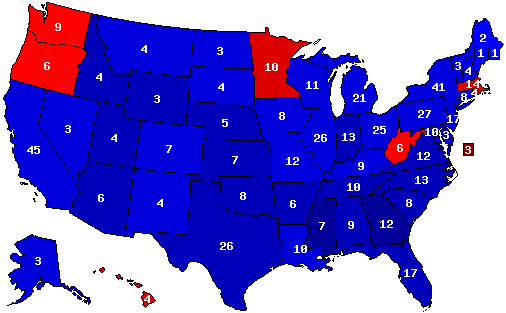
President Richard Nixon/Spiro Agnew-Republican: 482 EV 54.67%
Hubert Humphrey/Henry M Jackson-Democratic: 56 EV 43.02%
Why does Nixon get over 60% of the vote in Texas, Arkansas and Georgia?
1972 US election

President Richard Nixon/Spiro Agnew-Republican: 482 EV 54.67%
Hubert Humphrey/Henry M Jackson-Democratic: 56 EV 43.02%
Why does Nixon get over 60% of the vote in Texas, Arkansas and Georgia?
[Is about to bitch about the caucuses making primary results skewed]So I made a silly map loosely based on the 2016 Democratic Primaries, in a future America with leftier politics than OTL. States in orange are safe states for the New Democrats, a centrist to center left liberal party, green states are safe states for the Progressive Democratic Party, a center left to left wing democratic socialist party. Gray states are swing states. I didn't include the electoral college numbers (since those are liable to change drastically in the future) but as you can see, the New Democrats have a distinct E.C. advantage, however since California and Illinois have become swing states, victory for the Progressives is certainly within reach. That being said, in this leftier US, I doubt the electoral college would really last very long
View attachment 321605
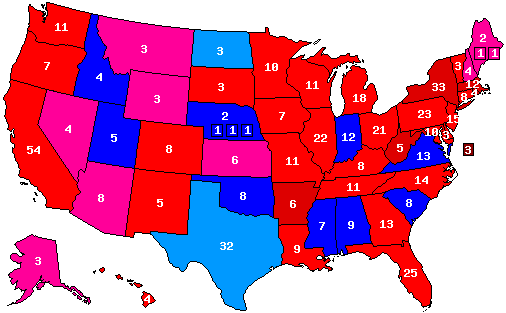
Clinton does very slightly better in 1992. I'm working on a county map for this as well.


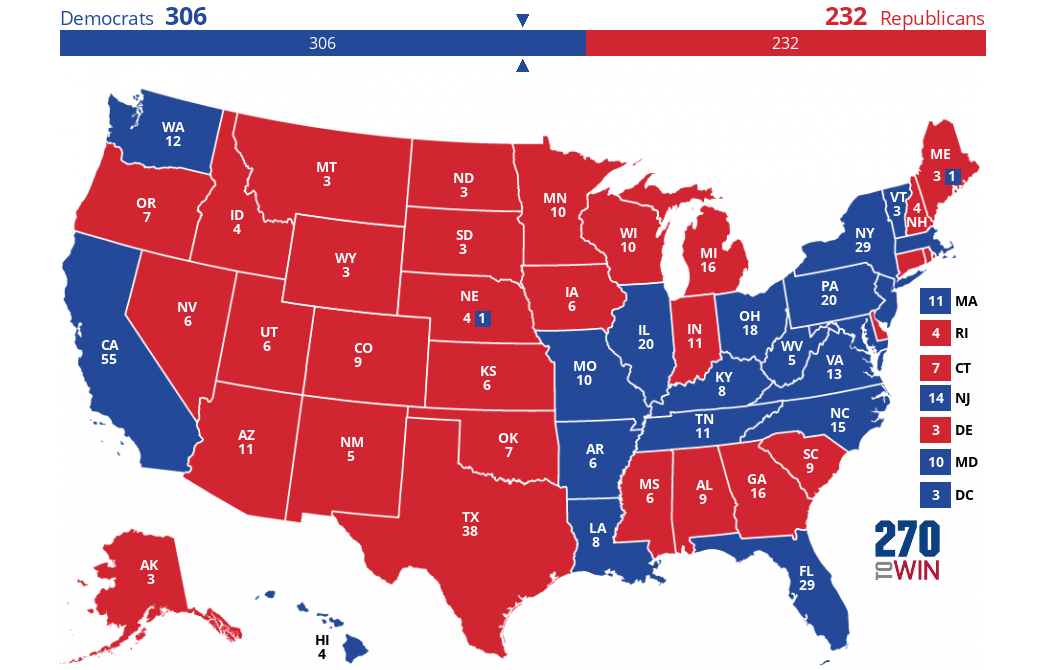

I'm struggling to understand the chain of logic within your TL, the circumstances that lead to these referendums, why such referendums happen even ITTL, or why they got the results they got.
Not really an alternate electoral map so much as an alternate referendum map:
Queen Elizabeth II dies in 2013. Scotland narrowly votes Yes to independence after Prince Charles, the Duke of Windsor (he passes on the throne to focus on the Prince's Trust and Prince's Foundation) says "while it would be sad for Scotland to leave, we would gladly welcome another Commonwealth realm into the family", with the "we" implicitly including King William. Support skyrockets for independence in Wales and Northern Ireland, as well as in the Channel Islands, with the knowledge that they can stay as Commonwealth realms. The Brexit referendum occurs before Scotland's departure is final, and Scots are still able to vote in it. Controversially, they swing the result from Leave to Remain after King William obliquely praises them for maintaining "Peace in Europe". That swing forces a second pair of referendums in December 2017 at several English activists' behest to fully devolve the UK into a set of four independent realms with the ability to set their own EU policy as well as freedom of citizenship (similar to that between the UK and Ireland for Northern Irish people). That referendum passes in each realm, although narrowly in England because of elderly voters fearing that it will "diminish the stature of the UK." A second referendum, to rotate the UN Security Council seat among the four nations of the UK, also passes, by lopsided margins in the smaller nations; the crown dependencies reject it as they are not allowed a chance to retain the seat.

I'm struggling to understand the chain of logic within your TL, the circumstances that lead to these referendums, why such referendums happen even ITTL, or why they got the results they got.
Charles wouldn't pass on the throne. Whilst Wales and NI would see Independence boost, the inclusion of the Channel Islands as countries vying for freedom form the English yolk is bizarre- you might as well have included the Falklands. W h y would Brexit still occur in a TL where both the Queen died in 2013 and Scotland left in 2014- the latter would lead to Cameron resigning, replaced by Boy George who would likely end up with a hung Parliament and Coalition Mk. II, which would see Brexit thrown out of the window. Even if this EU Referendum happens before Scotland Exits, why would Scotland be voting in it if they're literally about to leave and the negotiations are reaching conclusion? Actually what's even worse is that IoTL the plan was that Scotland would have been gone by March 2016 (and if the PoD is 2013, then this would still be the case), and the EU Ref had originally been planned for around now 2017. Unless Boy George brings it forwards, and why would he, Scotland wouldn't participate because it's a decision that the UK is taking and not them with their imminent departure. If the King makes such an endorsement for Remain, then he's going to cause a constitutional crisis on a scale not seen since Edward VII. Who are these English activists pushing for greater devolution? Because the only ones I can really think of are people like Jon Cruddas, and if there is an EU Referendum, this would lead naturally to assume he and his clique are not in power. Beyond that is pure fantasy, as what is being proposed is not devolution, but the full dismemberment and disintegration of the United Kingdom into independent nation states. I cannot stress how much of a leap this is.
The results also don't make sense, as you've failed to give us a reason to why the results are like that. Nor why, for some reason, Scotland is still involved.
I imagine Georgia would probably go Blue.This is never going to happen, But...

Joe Manchin/John Bell Edwards 306 EV ~ 52% PV
Donald Trump/Mike Pence 232 EV ~ 48% PV
I have Trump winning it by about 5,000 votes.I imagine Georgia would probably go Blue.
I imagine Georgia would probably go Blue.
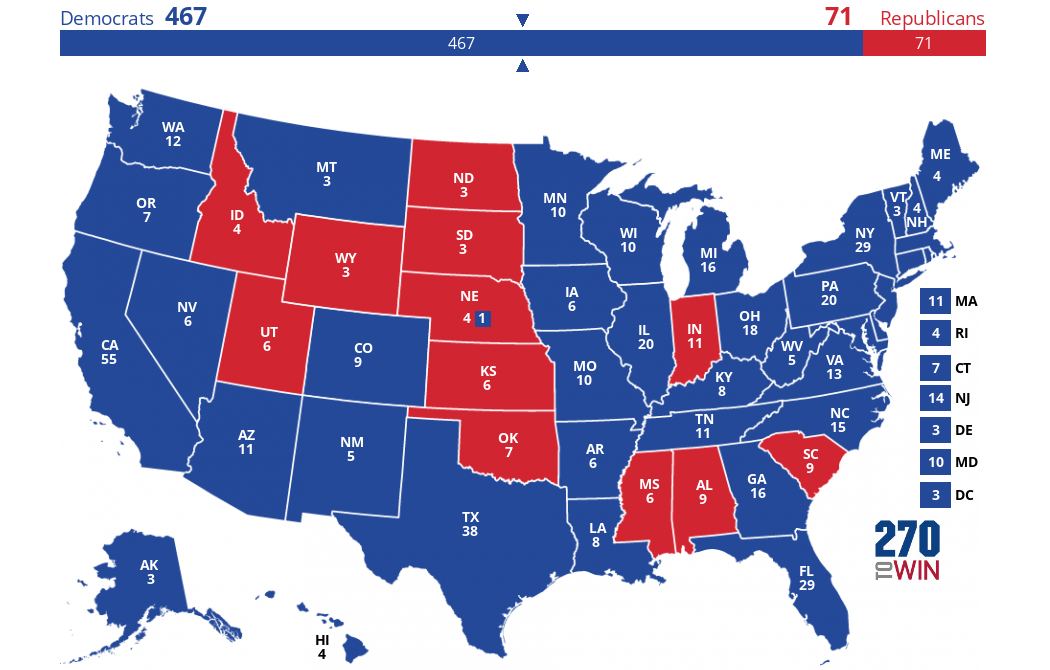
I doubt it. Didn't a recent poll show that something like 60% of Americans believe the Democratic Party is not in touch with their needs? The Dems should move in a more Populist direction.
This map is actually more realistic IMO. I think a Democratic ticket comprised of two centrist Southerners would absolutely blow an unpopular Trump out of the water in 2020.
I doubt it. Didn't a recent poll show that something like 60% of Americans believe the Democratic Party is not in touch with their needs? The Dems should move in a more Populist direction.
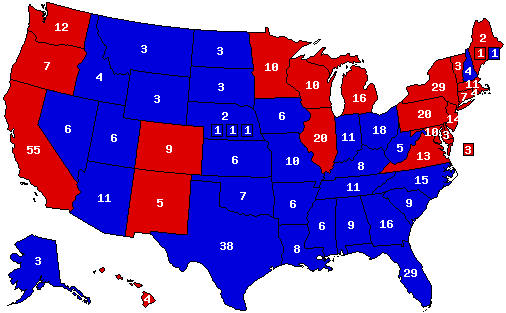
Just for shits and giggles, the map in 538's current polls-only forecast. Technically, it works with probability, so this isn't totally accurate, but it is what'll happen if each state voted exactly as the polls-only most-likely forecast has it voting. (That was a confusing sentence. I apologize.) Maine's 2nd CD puts Trump over the top.
Donald Trump (R-NY)/Mike Pence (R-IN) - 270 EV, 44.9% PV
Hillary Clinton (D-NY)/Tim Kaine (D-VA) - 268 EV, 46.1% PV
Gary Johnson (L-NM)/William Weld (L-MA) - 0 EV, 7.7% PV
And also that Trump won despite losing the PV by 2 points
Imagine how pissed off a lot of voters would be if that happened. And you thought 2000 was bad.
Oh fuck.